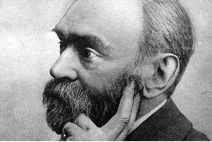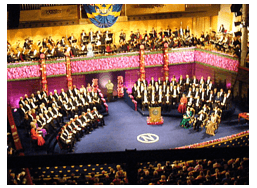For the last 112 years, news media from all over the world have focused on a series of very undramatic events in Stockholm, one week in October every year: the announcement of this year’s winners of the four Nobel Prizes in medicin, physics, chemistry and literature. The prize winners are announced in that order on the first four days of the week, and on the last day, Friday, focus is shifted to Oslo, where the winner of the Nobel Peace Prize is announced. On the following Monday, focus is shifted back to Stockholm the announcement of this year’s winners of the Swedish National Bank’s Prize in Economic Sciences in Memory of Alfred Nobel.
Speculations about who will win this year’s prizes appear in news papers and magazines the preceding week, and wild discussions about the choices follow during the weeks afterwards: were the choices well-founded or not? Is there another scientist, more worthy the prize?
The winners of the Nobel Prizes will receive a gold medal and a large sum of money, presented by the king of Sweden, at a ceremony in Stockholm on December 10, which is the day of Alfred Nobel’s death; the Peace Price is presented on the same day in Oslo by the Speaker of the Norwegian Parliament.
So, who was Alfred Nobel? How much money will the winners get? Who decide about the winners? Why is the Peace Price presented in Oslo? Why do only unknown authors receive the Literature Prize.
Alfred Nobel – still waiting

Alfred Nobel was born 1833 in Stockholm, son to Immanul Nobel, a descendant of Olof Rudbeck (a reknown professor in medicin in the 17th century, who discovered the lymphatic system, also a botanist). Alfred was very talented in many areas and interested in engineering, chemistry, medicin and literature.
Alfred’s father was an entrepreneur and inventor with his own workshop, but his business went bankrupt. The Nobel family emigrated to St Petersburg 1842 and started over from deep poverty; the ten-year old Alfred had to contribute to the family’s economy by selling matches in the streets of St Petersburg. His father had started a foundry and mechanical workshop which produced mines for the Russian army. The business was thriving for several years, but the end of the Crimean war also ended the business, and in 1863 the family returned to Stockholm, to start a factory for production of nitroglycerin, and a laboratory for experiments with explosives. Nitroglycerin is a very unstable substance that will explode at a minor blow or jolt, and Alfred’s brother and a few other people were killed in an explosion in 1864. Alfred realized that the power of nitroglycerin had to be harnessed.
Travelling in France and Germany, Alfred continued his studies and experiments with nitroglycerin, and in 1866 he came in contact with the mineral diatomite. Diatomite or kiselgur is a naturally occuring granular substance, a billion-year old fossile of single-cell algae, consisting almost entirely of silica. Alfred discovered that soaking diatomite in nitroglycerin produced a dough that was quite insensitive to jolts and blows, but would explode when ignited by a small charge of gunpowder. The new explosive was named “dynamite” after the Greek word “dynamis”, which means “power”. This was Alfred Nobel’s lucky roll. The invention of dynamite was patented in 1867, and became a world success that revolutionized mining and tunneling.
During the following years, Alfred Nobel and his brothers founded 30 or more different companies all over the world. Some of these produced explosives or cannons, but the Nobel brothers also invested in oil drilling in Baku in current-day Azerbajdzjan. The Branobel Oil company became one of the biggest oil companies in the world, second only to Rockefeller’s Standard Oil, but was nationalized after the Russian revolution.
Alfred Nobel continued as an inventor and was the owner of more than 350 worldwide patents. Among his other inventions was Ballistit, known as “smoke-free gunpowder”, which also became a success in the world’s armies. He was also a poet, author and philosopher. Today his writing is remembered mainly in his aphorisms; here’s a few of them:
- “Contentment is the only real wealth.”
- “Second to agriculture, humbug is the biggest industry of our age.”
- “The best excuse for the fallen ones is that Madame Justice herself is one of them.”
However, Alfred Nobel was a peace-lover with an almost naive belief in the good powers of the human race; he is quoted saying that once people have realized the immense destructive power of his inventions, it will be the end of all warfare. (Unfortunately, we’re still waiting for the miracle to come…) He was therefore very disturbed by reading his own obituary in a French newspaper, which, referring to his inventions, depicted him as a tradesman in death. Now this was a double mistake by the editor: he had mistaken Alfred Nobel for his brother, who was recently deceased. Nevertheless, Alfred decided that he wanted the world to remember him differently, and changed his last will to create what we today know as the Nobel Prizes in Medicin and Physiology, Physics, Chemistry, Literature, and, above all, the prize for efforts to promote Peace.
Alfred Nobel died on December 10, 1896 in San Remo, Italy. The Nobel Prize ceremonies are held on this date every year.
The Nobel Prizes

Along with the gold medal, the Nobel Prize winners will receive a substantial amount of money. The exact sum varies, depending on last year’s results for the Nobel Foundation. In recent years, the sum has been around SEK10,000,000 which is approximately equal to USD 1,500,000.
The winner of the Nobel Prize for Literature is appointed by De Arton (the eighteen), more known as The Royal Swedish Academy. This institution was created AD 1739 by king Gustav III, an institution to promote wit and erudition, consisting of the 18 most prominent writers in the country. Once elected to the Academy, the chair is yours for the rest of your life. Who decides which persons are prominent enough to hold a chair in the Academy? The Academy itself. When a member is deceased, the remaining 17 meet to confer who will take the empty chair. Why isn’t ever a well-known author awarded the prize? I don’t really know, but, by the way, haven’t you heard of Rudyard Kipling, Anatole France, George Bernard Shaw, Thomas Mann, Sinclair Lewis, John Galsworthy, Pearl Buck, William Faulkner, Winston Churchill, Ernest Hemingway, Albert Camus, John Steinbeck, Jean-Paul Sartre, Samuel Beckett, Alexander Solsjenitsyn, Heinrich Böll, Toni Morrison, Dario Fo, Günter Grass, or Doris Lessing?
The winners of the Nobel Prizes for Physics and Chemistry are appointed by The Royal Swedish Academy of Science, after having been proposed by the Academy’s committees for each subject. (Notice that this is a different institution, consisting of prominent scientists in 10 scientific fields, such as mathematics, physics, chemistry, astronomy, geology,…) Currently, the Academy of Science has 615 members, of which 175 are foreigners, mostly reknown professors from the world’s best universities.
The winner of the Nobel Prize for Medicine or Physiology is appointed by the Nobel Assembly at Karolinska Institutet after having been proposed by the Nobel Committee for Physiology or Medicine at Karolinska Institutet. The Committee consists of 15 Swedish professors of physiology or medical subjects active at Karolinska Institutet, although the Nobel Assembly at Karolinska Institutet in principle could appoint anyone to the Committee. Other than five ordinary members, ten associated members are appointed each year, for that year only. Karolinska Institutet (formerly often translated to English as the Royal Caroline Institute) is a medical university in Stockholm.
The winner of the Nobel Peace Prize is appointed by the Norwegian Nobel Committee, which consists of five persons, appointed for six years each, by the Norwegian Parliament. Why is this? At the time for the creation of the Nobel Foundation, Sweden and Norway were united. The union ended in 1905 after peaceful negotiations in Karlstad, Sweden. At the separation, it was agreed that Norway should keep the right to appoint the Peace Prize winner.
Finally, the winner of the Swedish National Bank’s Prize in Economic Sciences in Memory of Alfred Nobel, is appointed by The Royal Swedish Academy of Science, after having been proposed by the Academy’s committee for economic science.